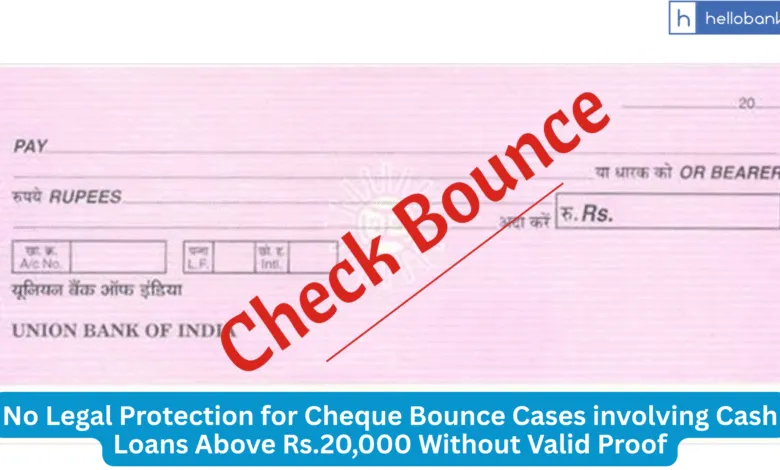No Legal Protection for Cheque Bounce Cases involving Cash Loans Above Rs.20,000 Without Valid Proof

The Kerala High Court has given an important judgment about cheque bounce cases, especially when the loan amount was paid in cash. The court said that if someone gives more than ₹20,000 in cash as a loan—violating the Income Tax Act—then that money cannot be considered a legal debt unless the person giving the loan provides a valid explanation.
Court’s Main Observation
Justice P.V. Kunhikrishnan clearly stated that if a cash loan above ₹20,000 violates the Income Tax Act, 1961, it is not automatically a “legally enforceable debt” under Section 138 of the Negotiable Instruments Act, 1881, which deals with cheque bounce cases. However, if the accused wants to avoid punishment, they must challenge the transaction with proper evidence and create doubt about the legality of the loan. The burden is on the accused to prove it through the balance of probability, not beyond reasonable doubt.
What This Means for Cheque Bounce Cases
If someone gives a large loan in cash and the cheque given to repay it bounces, the court will ask if the loan was legal. If the lender cannot explain why the loan was given in cash (violating the Income Tax Act), then their case might not stand in court under Section 138.
Background of the Case
In this case, a person named P.C. Hari was accused of issuing a cheque worth ₹9 lakh to Shine Varghese. The cheque bounced due to insufficient funds. Shine claimed he had given the money in cash and that the cheque was issued to repay this loan. However, Hari argued that the cash transaction was illegal because it violated Section 269SS of the Income Tax Act, which says that loans above ₹20,000 should be made only through cheque, bank draft, or online transfer—not in cash.
Key Questions the Court Answered
- Does Section 139 of the NI Act assume all cheques are for legal debts?
Yes, but the accused can challenge this assumption with enough evidence. - How can an accused challenge the assumption?
By presenting a believable argument or facts that raise doubt about the legality of the debt. - Can a cash loan above ₹20,000 be treated as a legal debt?
Only if a valid reason is given under Section 273B of the Income Tax Act. Otherwise, it is not legally enforceable. - Did the complainant prove the debt was legal?
No. He admitted he did not pay tax and gave no explanation for the cash loan. So, the accused successfully raised doubt, and the court ruled in his favor.
Applies to Future Cases Only
The court also said this rule will only apply prospectively—which means it will be applied in new cases going forward. Cases that have already been decided and where this issue was not raised earlier will not be reopened.
Why This Judgment Matters
- Discourages Cash Transactions: This decision discourages people from giving or taking large amounts of cash without following tax laws. It supports the government’s push for Digital India and transparency in financial transactions.
- Responsibility on Lenders: Now, people who give loans must make sure they do it legally—either through banks or with a proper explanation—otherwise, they may lose legal protection in case of cheque bounce.
- Gives Power to Accused: Accused persons can now argue that the cheque was given for a debt that is not legally valid, especially if it violated tax laws.
Download Court Case PDF (This PDF is available for Premium Users Only. Click here to join premium)
